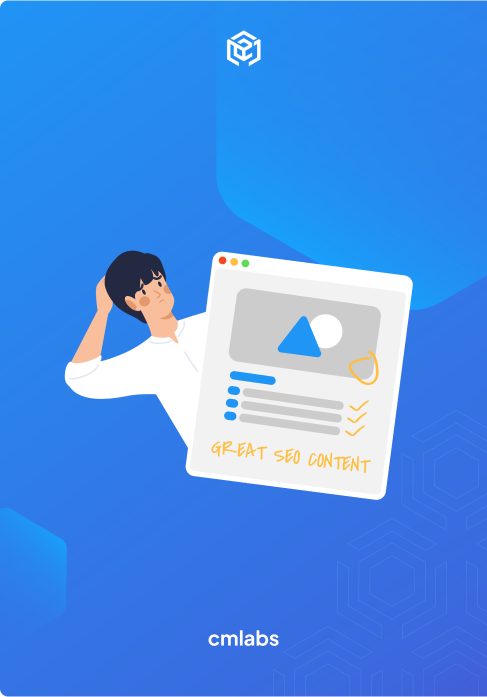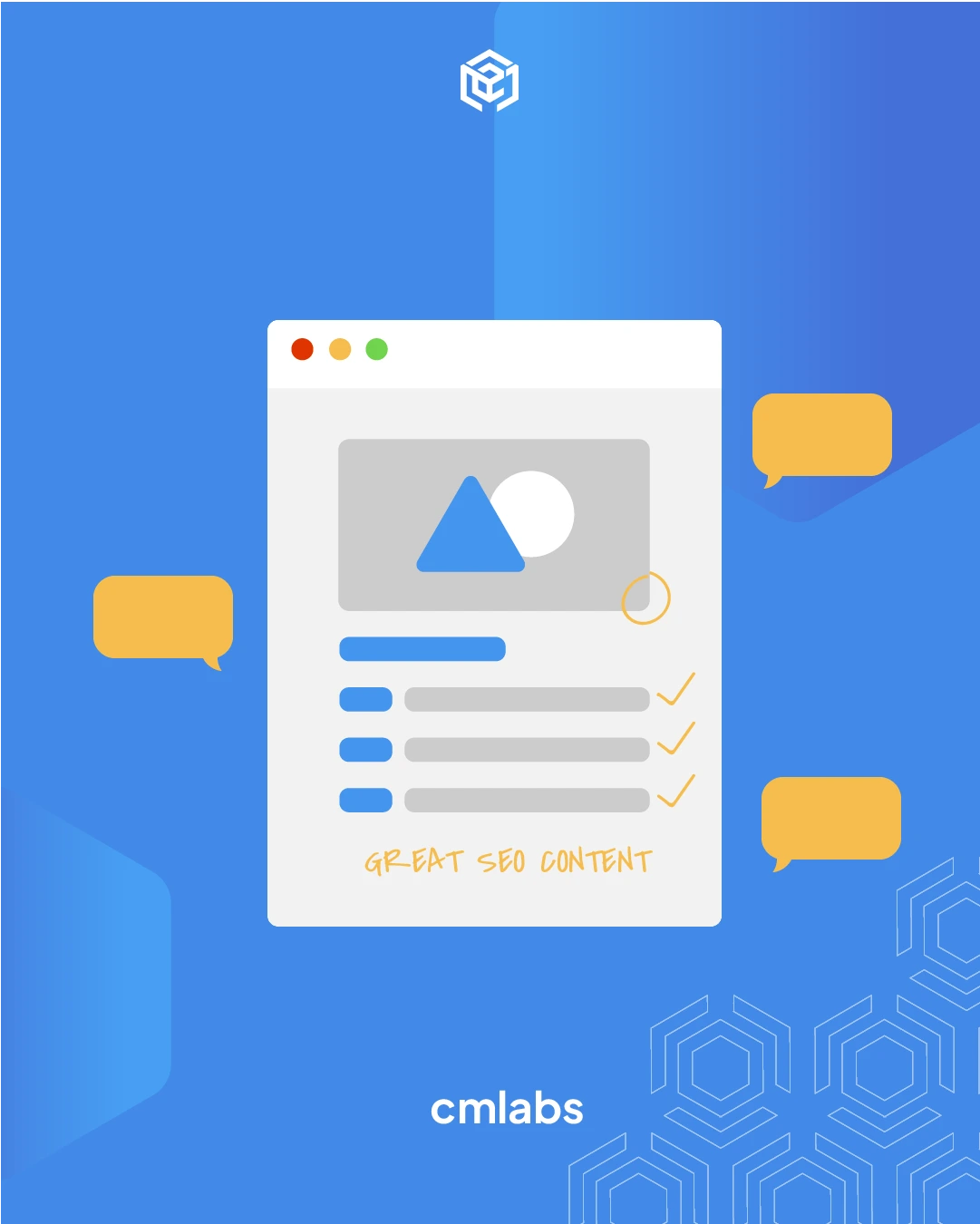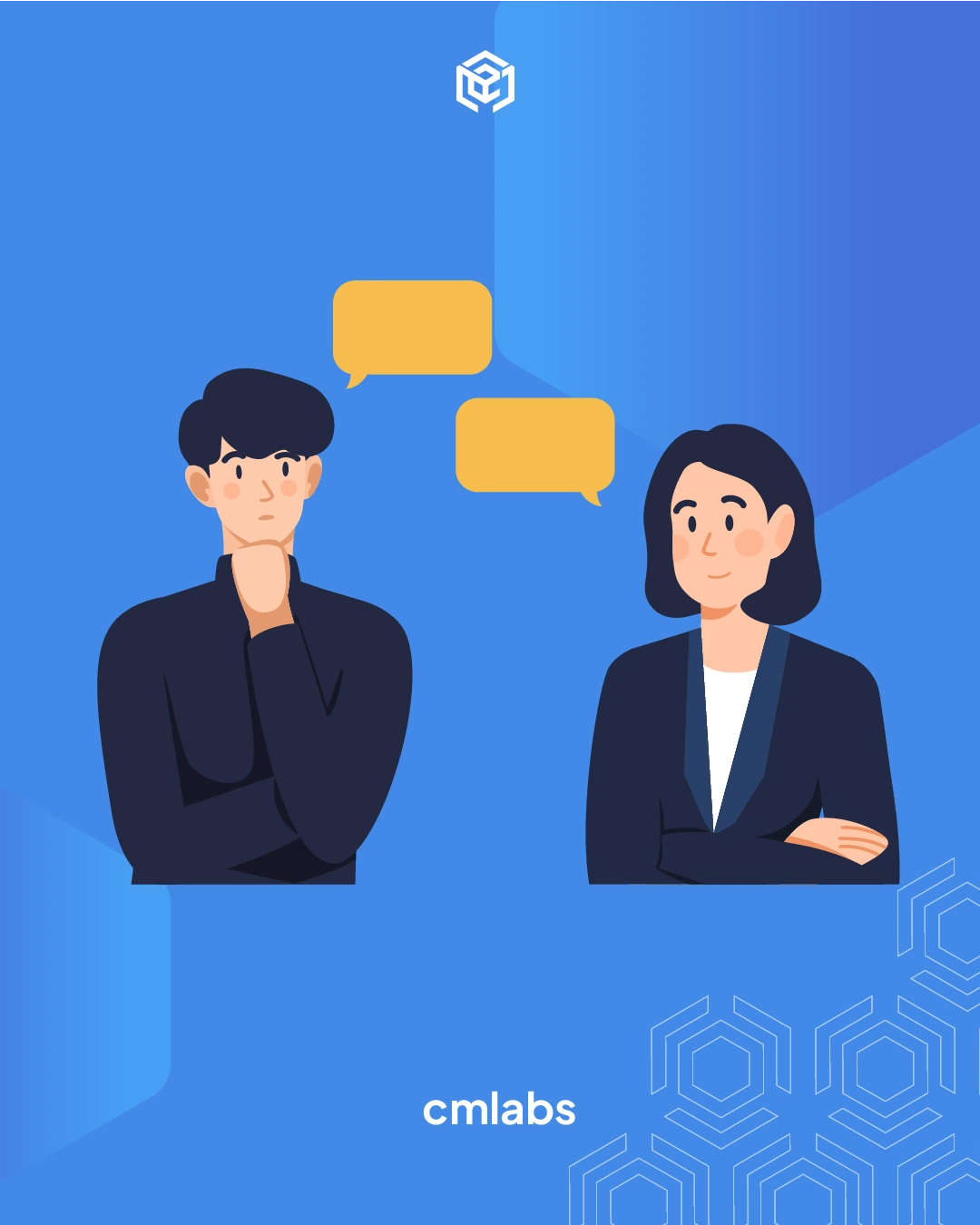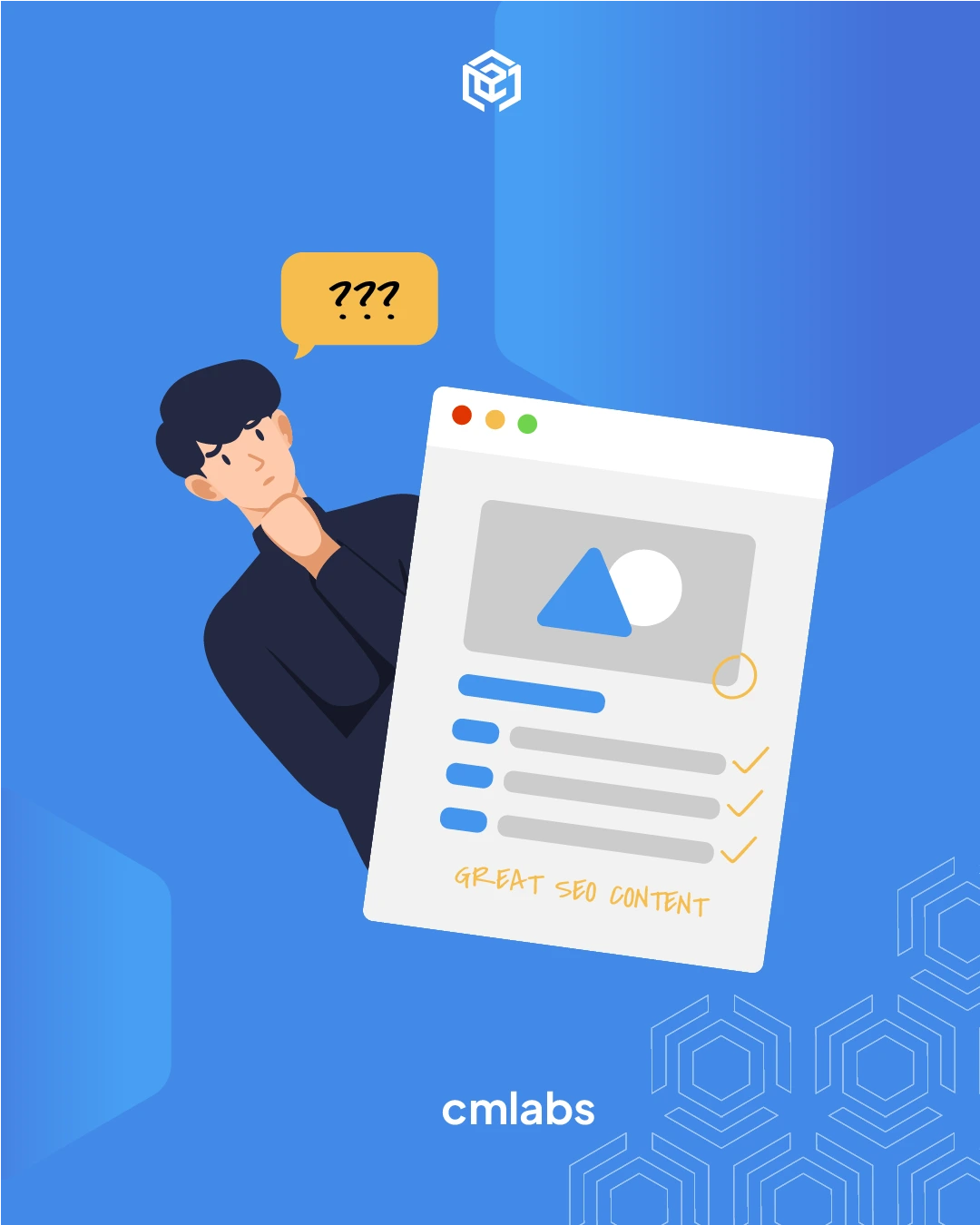We use cookies
This site uses cookies from cmlabs to deliver and enhance the quality of its services and to analyze traffic..
SEO SERVICES
Conduct in-depth technical website audits, strategically develop website projections, and increase your website authority.
ASO SERVICES
Elevate Your App’s Presence with Our Expert ASO Services – Boost Visibility and Drive Downloads!
WRITING SERVICES
We offer a variety of writing services to suit different business necessities. Reach broader audiences or lead specific industries? We've got you covered!
SEOlutions
A unified source of truth!
SEO & Digital Maternity Solution
SEO & Digital Maternity Solution: Leverage Cross-Platform Insights to Elevate Your Strategy with Expert Consultation
SEO & Digital Maternity Solution
Data Solution options:
Starting from Rp200 mio
Reinventing how a company get creative treatments
A new way to get your creative needs done. Agile team, efficient cost, and expedient way in a flexible yet scalable subscription plan!
Creative-as-a-Services
CaaS package options:
Based on Subscription
Pioneer in digital marketing software powerhouse
We’re excited to unveil our new range of Tech Solutions designed to drive your digital success. Whether you’re looking to enhance your website’s performance, streamline your tech stack, or unlock deeper insights from your data, we’ve got you covered.
Starting from Rp250 mio
Our Clients
Research and innovation center for digital transformation
Digital marketing combines technical skills and business knowledge at every stage. For marketing teams, improving budget management efficiency is crucial, as time is an invaluable resource that should be used wisely. At Sequence, we are dedicated to empowering you to optimize efficiency and strategic planning, ultimately enhancing the impact of your digital marketing efforts.
Subscription-based (IDR1,800/keyword)
Our Clients
BeyondSEO
References
SEO Tools for Webmasters
SEO Tools for Writers
SEO Tools
FIND THE SUITABLE PARTNERSHIP FOR YOUR COMPANY
Check out which cmlabs partnership program suits your company
WHITE LABEL SEO
for CorporateYour company is granted exclusive partnership rights to provide SEO services to our important clients, and we will provide a dedicated backend team to support your efforts.
AFFILIATE PROGRAM
for BizdevA new affiliate program is being introduced for skilled marketers and individuals with strong networks, offering commissions of up to 7% for generating profits independently.
DIGITAL AGENCY
for Marketing Partnerscmlabs is an essential partner for digital agencies, providing a unique selling proposition in Search Engine Optimization (SEO).
BACKLINK PARTNERSHIP
for Media / BloggerWe have a vast database of bloggers and media outlets across Indonesia, categorized by region and media type, giving our clients an edge in managing their media and SEO activities.
OFFICIAL TRAINING
We provide ongoing professional development and support to SEO professionals to ensure they are equipped to meet market demands.
JOIN AS CONTRIBUTOR
for Content WriterGreat opportunity for SEO Writers around the world. T&C applied!
ACADEMIC PARTNERSHIP
Through partnerships with universities in Indonesia, cmlabs has helped align academic curricula with industry demands.
Partnership
Sector & Industries
Tell us your SEO needs, our marketing team will help you find the best solution
As an alternative, you can schedule a conference call with our team
Schedule a Meeting?Contact
Survey
We use cookies
This site uses cookies from cmlabs to deliver and enhance the quality of its services and to analyze traffic..
Last updated: Nov 06, 2024
Sometimes you may have multiple duplicates of a page on your website. These duplicate pages confuse search engines and can be detrimental to your SEO. Of course, this will lead to a loss of ranking and traffic. To avoid these issues, you need to set a canonical URL.
In this article, we will discuss how to set canonical URLs and the best practices to follow. But before we start, let’s first understand what it is and why you should care about it. Read the full article below to find out more.
Canonical URLs are the preferred version of a webpage that search engines choose as the main version when there are duplicate pages. This helps search engines like Google index the most representative version from a set of duplicates to avoid confusion.
Imagine a website with multiple identical pages for the same content. Search engines may have difficulty choosing the correct version of the page, which makes them confused and ends up diluting your page’s authority.
However, by setting up canonical URLs, you can lead the search engines to index and rank the page you want to be displayed in SERPs. The page you choose as the canonical URL is considered the primary version of the page.
Look at a canonical URL example here:
In this case, Google will likely choose the canonical URL as it is more concise, clear, and direct. These are the criteria that Google sees as a suitable candidate to be indexed and ranked.
Canonical URLs and canonical tags are two essential components of SEO that are related to each other. While they are both used to solve duplicate content, they have distinct roles in addressing this issue.
Canonical URL refers to the preferred URL that you want search engines to index as the primary version of the page. Meanwhile, a canonical tag, also known as meta canonical, is a piece of code that signals this preference to search engines.
Think of canonical tags as a simple way to tell search engines, "Hey, this is the main version of this page. Please focus your attention here." It's like pointing a flashlight at the most important page among a group of similar ones.
The canonical tags are usually written as (rel="canonical") in the head section of the HTML code of the page. This code will specify the canonical URL and guide the search engines to define the primary version of the page. See the example below:
<link rel="canonical" href="https://example.com/main-page/" />
Which specifies the canonical URL of: https://example.com/main-page
To put it simply, a canonical URL or canonical link is the most representative URL of duplicate content you want search engines to index as the primary version. On the other hand, canonical tags are used to specify the preferred URL for a particular page.
After identifying what is canonical URL and the difference between canonical tags, you will need to learn how to implement canonical tags on your site. To do this, make sure you follow the step-by-step guide below:
First thing first, find duplicate pages on your site and make a list of them. You can identify duplicate pages by using various tools, such as Google Search Console, Site Audit, as well as CMS plugins. Using those tools will make the process easier and faster, especially if you have a large number of pages on your site.
When you have identified all duplicate pages, it’s time to choose the version of the page you want to canonicalise. If you are not sure which one to choose, consider the following tips to help you make the right choice:
Now, you have to decide which version of the duplicate page you want to add a canonical tag <link rel=”canonical”>. Usually, this snippet is added in the head section of a page.
For example, you may have a duplicate page of the homepage of your site with the following URL:
https://www.examples.com/v2
However, that is not the URL for the homepage that you want indexed, but rather:
https://www.examples.com/
You can add the canonical tag to guide search engines to the original version of the page using the HTML code. Here is what the canonical link tag will look like:
<link rel="canonical" href="https://www.examples.com/” />
By using this signal, Google will know which page to prioritise and will not index the other pages.
Canonical SEO is a great way to avoid indexing issues caused by duplicate pages. Therefore, it is important to implement this strategy carefully. To get the most out of canonical URLs, you should follow the best practices that are outlined below.
The first tip is to make sure you use the full URL, including the “https://” prefix to ensure clarity. This is a preventive step to avoid any misinterpretation by search engines.
So, keep in mind that you must write the URL like this:
<link rel="canonical" href="https://examples.com/hub/seo/seo-keywords/" />
Instead of the alternative version:
<link rel="canonical" href="/hub/seo/seo-keywords/" />
A canonical tag points out the preferred or original version of duplicate pages. Therefore, you need to ensure that the corresponding version truly exists on your site.
You also need to double-check to ensure there are no typos.
Besides, be sure that the deleted or redirected version of the page is updated in the canonical link element.
Enforce canonical URL elements within your HTML code of the preferred page itself. Thus, it will emphasise search engines to index the current page in search results.
Self-referencing links will also be useful for a page that doesn’t even have any duplicate pages, as it can prevent issues caused by incorrect URL parameters.
Note that each page should only have one canonical link element in order to avoid confusion for search engines. Here are some guidelines for you to follow:
A sitemap is actually the road map of your site that helps search engines index your pages. By listing the non-canonical URLs in your sitemap, you are sending a mixed message to the search engines.
Why is this a problem? Well, when there are multiple versions of the same page, search engines might not know which one to index, which means that your page might not be indexed at all.
To check if your site has non-canonical URLs in your sitemap, you can use tools like Site Audit to get a report of non-canonical URLs and remove them accordingly.
A 404 status code is a type of error code that is returned by the server when a page cannot be found. This often happens when a page has been deleted or renamed. If a 404 error is set as canonical, the search engines will be unable to crawl the content of the page.
The best way to avoid this is to set the 301 redirect to the new page instead. 301 redirects pass the link equity to the new URL, which informs search engines that the new URL is the canonical one.
Conclusion
Those are the basics of canonical URLs you need to know. By understanding what it is and why you need it, you can implement it and reap the benefits it can give you, one of which is ensuring optimal search engine visibility.
However, setting up canonical URLs can be challenging and technical. To make it easier for you, you can always hire a professional and competent SEO expert to help you out. SEO Services by cmlabs is a great partner to work with for your SEO needs, including canonicalisation.
We will take care of all technical aspects of canonicalisation and help you achieve better search engine visibility. So, do not hesitate to contact our marketing team today and get your site optimised to get the best results!
WDYT, you like my article?
Couldn't find result for "Mulki" try to search with different keyword
Suggestion:
Tell us your SEO needs, our marketing team will help you find the best solution
As an alternative, you can schedule a conference call with our team
Schedule a Meeting?



cmlabs Jakarta Jl. Pluit Kencana Raya No.63, Pluit, Penjaringan, Jakarta Utara, DKI Jakarta, 14450, Indonesia
(+62) 21-666-04470These strategic alliances allow us to offer our clients a wider range of SEO innovative solutions and exceptional service.

Psst! Hey there, SEO Stats and Tools SEO company! If you've ever planned of conquering the United Arab Emirates market, you've come to the right place!